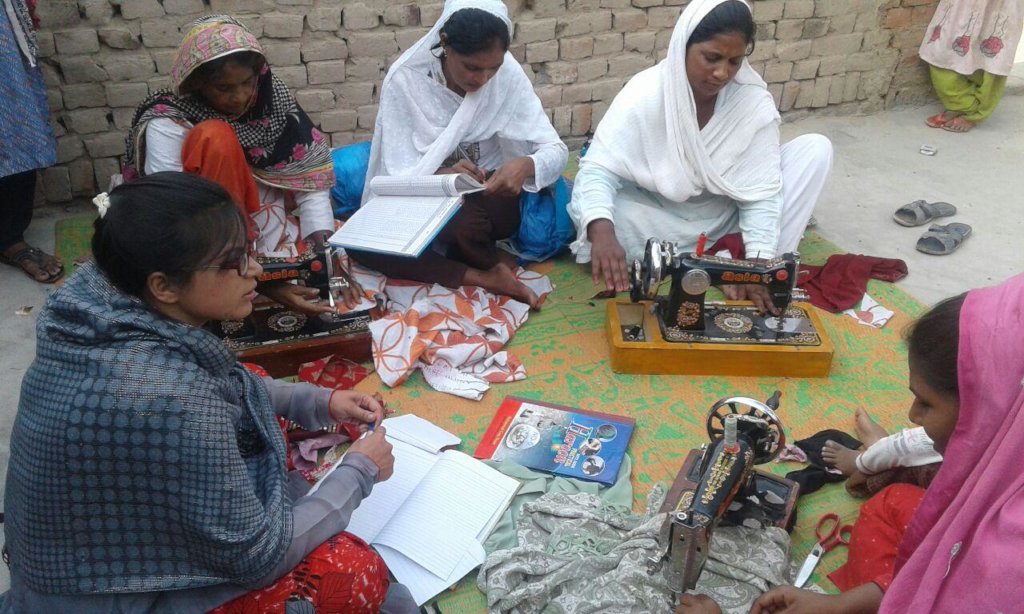Social cultural barriers create hurdles for females of rural areas in Punjab, Pakistan. Due to implementation of strong hold of elder male in home, they cannot nourish their abilities and professional growth. There is an inequality in gender equality between women and men in the different fields of life. They cannot enjoy their lives as compared to urban females. There are different socio-culture factors affect the professional growth of the rural area female teachers. They seldom get chances for higher education, their own business, participation in political activities and Co-curricular activities. Moreover, there is no rural community support, lack of facilities in school infrastructure, involvement of household activities, agricultural involvement, unawareness about their rights, unawareness of social networking, and transportation problems etc. All these factors create stress in the routine activities of females. Besides, appropriate rules and public awareness programs for females, awareness at rural areas should be encouraged for the professional growth of the rural area females.
Pakistan is facing different socio-cultural barriers in professional growth of females of rural areas. Multifaceted problems existed due to the old and out-dated socio-cultural customs and traditions within society which confine their entrance to rewarding services and other productive assets, and as a result, their prospective is left behind unexploited and unutilized. The six-labor policy was released in 2022, which mentioned an increase in wage rate of unskilled workers up to Rs. 30,000/- per month and encouragement of skilled and empowered workers. The structure supported inflexible allotment of labor and containment of female freedom. There is inequality between women and men in the field of education, service, political contribution, judgment, scheming, admittance to health amenities and job opportunities. There are fewer opportunities for female’s education in Pakistan. The current position of female’s disparity in the relatives and in the public is not well thought-out acceptable in the system where she is differentiated.
In Pakistan, a person is called literate if he or she can read or write. The literacy rate of Pakistan is 53% which is not heartening, comparative to the other countries of the world. There is bigger inequality in the literacy rate of male and female. It was found that in Pakistan 42% of the total female population in the age bracket of 10 and above is literate. Likewise, 48% of women are literate as compared to the 67% of the male in Punjab province. This study specifies that women are less advantaged in schooling than men. Pakistan is facing awful condition in expression of female’s contribution in employment. As per world economic forum 2008, the participation in labor activities of females in Pakistan are second ranked lowest of the world among 128 countries.
Participation of females in political activities is also very low as compared to males. These upsetting facts and statistics regarding women’s condition give rise to other problems across the country. They have less chance to gain property or land. They are even expelled from their heritage rights. They identify as independent female is lost under the heavy burden of domestic work and responsibilities. Furthermore, they have less involvement in decision making, fewer control over resources, unaware of their rights, low earnings in remunerated work, sexual persecution at workplace, at marketplace or other community places, hygienic insufficiency, unsafe baby birth, underprivileged health stipulation, sexual & substantial brutality, etc.
According to the constitution of Pakistan 1973, the government sanctioned the equal rights of all citizens such as irrespective of religion, cast, and sex, in the mentioned of law. The government has signed many affirmations and rules regarding gender equalization and abolition of aggression against females. The government has taken many steps for the protection of rights and launched a National Plan of Action (NPA) for women on 14th August 1998. Health, violence, property rights, armed conflict, economic rights, education and training, and decision-making power, follows human rights, creation of pleasant environment for women, role on social media, and girl child.
Conclusion
The females of rural areas are facing numerous types of problems such as socio-cultural custom, traditions within society that confine them in their home. The participation of female in political activities is very low as compared to male. As per constitution of Pakistan in 1973, the government has sanctioned the equal rights of all citizens such as irrespective of religion, cast, and sex, in law. Unfortunately, our community gives the preference of males than females in different community programs and aspects. Many females must follow substantial ethnicity professionally, pardah (veil) accurately a drape representing and create a system on remoteness of female. They consider the female as inferior and secondary citizens which can be due to cultural traditions and norms in their entire social life. They travel less than male due to restrictions and limited resources. The multiple factors effect in discouraging female education. Most of Women of the rural areas of Pakistan are passing their lives under a feudal system where they have no importance and underprivileged of civil rights specified by laws and common in teachings of Islam. The financial empowerment of female facilitates in plummeting many problems in the society. Due to lack of poor financial resources, and political instability, female can’t perform well and chose better option for their better future. They have to spend 16-18 hours daily in domestic and livestock home activities without seeking any cost. All these things show the negative impacts on females’ professional growth in rural areas of Punjab, Pakistan.




